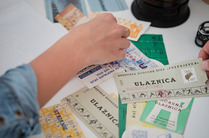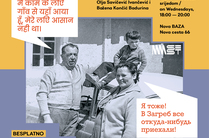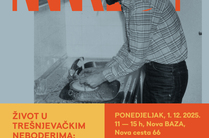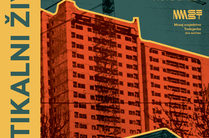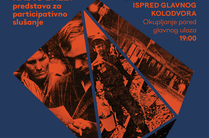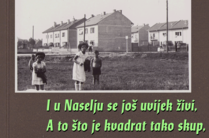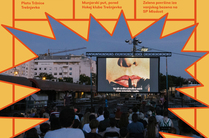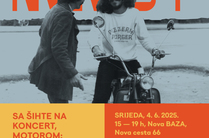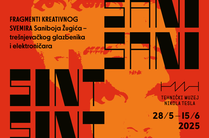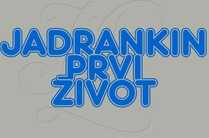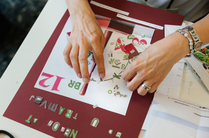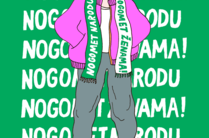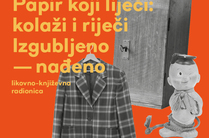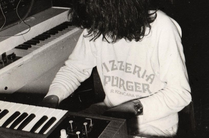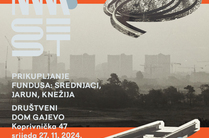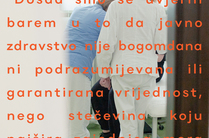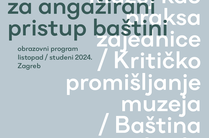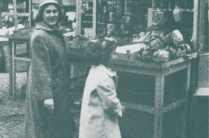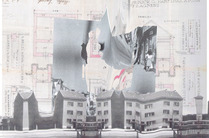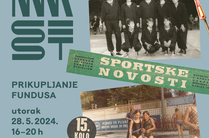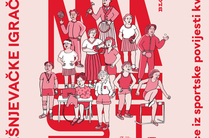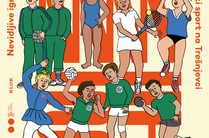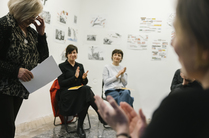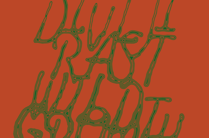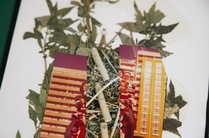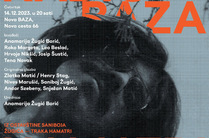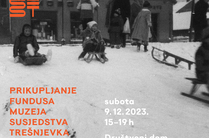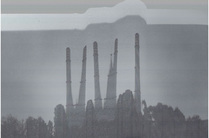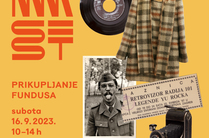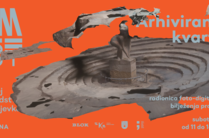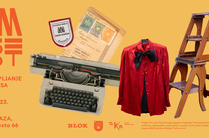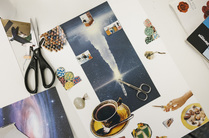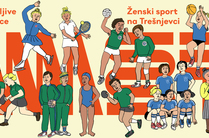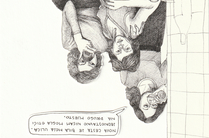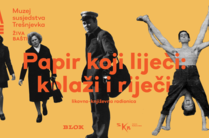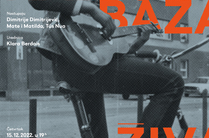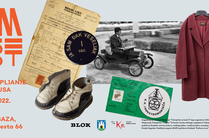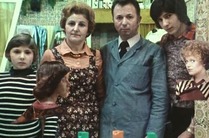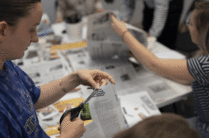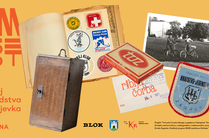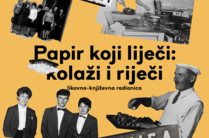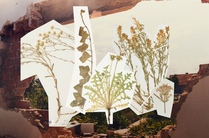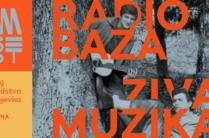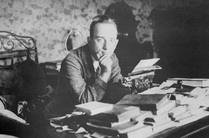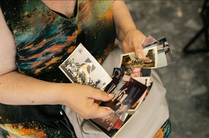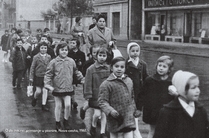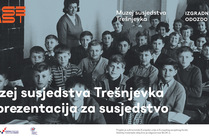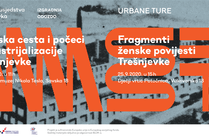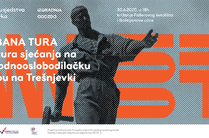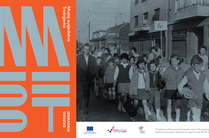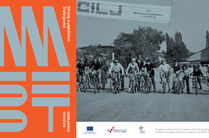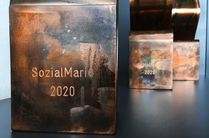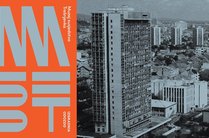WORKSHOP ON SOCIALLY ENGAGED APPROACH TO HERITAGE
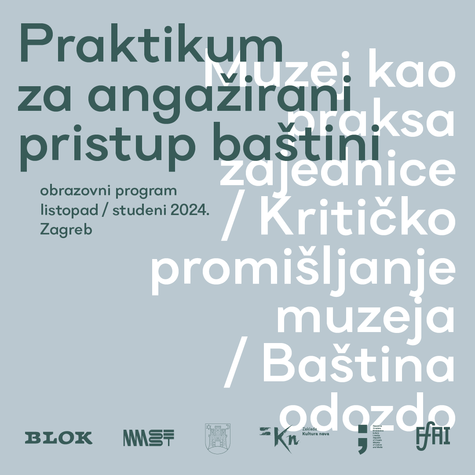
EDUCATIONAL PROGRAM
October / November 2024
ZAGREB
Sign up for a free education on socially engaged and critical approach to museums and heritage. Starting from a long work practice in the local community and recording of neighborhood history from below as part of our Trešnjevka Neighborhood Museum program, through discussions, workshops and field work, we will open topics related to neighborhood museums, colonialism, housing question and museums, antifascist heritage, and revisionism.
This interdisciplinary practicum is targeted at students in Humanities and Social Sciences (Museology, Archivistics, Art History, History, Ethnology and Anthropology, Sociology, Journalism, Political science), Architecture, Design, Art Academies, and other studies.
Part of the program is open to the general public (no sign up necessary).
The program is completely free of charge, including travel and food expenses in Ogulin and Drežnica. The number of participants is limited, with the exception of the public seminar, which will be held on November 7.
Please send your applications to blok@blok.hr (subject: Practicum) by October 13 2024.
The participants will be informed of the results by October 15, at the latest.
The applications should contain the following data: name and last name, title of study, course and year, as well as a brief motivation letter (up to one page) with an explanation why you are interested in this program, and if and to what extent you are familiar with the topics. Previous knowledge is not a prerequisite nor advantage in selection of candidates; however, the information on your previous education will help us prepare the content of the program. Participants will be chosen based on their motivation, possibility of regular attendance, as well as readiness to participate in collective work.
*PROGRAM*
Wednesday, October 23 | 4 – 8 PM |
Introductory meeting and presentation of the Trešnjevka Neighborhood Museum program
We will meet each others, present the program and the exercise participants will be continuously doing throughout the Practicum. We will present BLOK’s Trešnjevka Neighborhood Museum program through a walk around Trešnjevka, and a presentation of the virtual collection and a discussion in the new BAZA.
The objective of the Trešnjevka Neighborhood Museum is to preserve, explore, reevaluate, and actualize the rich working-class heritage of the largest Zagreb neighborhood. We are interested in the heritage official institutions often bypass, and that originates from Trešnjevka’s residents and workers. Local history becomes a tool in understanding the processes that shape the neighborhood, but also a trigger for being more socially engaged in today’s Trešnjevka. What we mean by ‘’museum’’ is not a building, but rather creation of the space for collaborative preservation and interpretation of heritage, socialization, and joint action.
There are two key segments of the Trešnjevka Neighborhood Museum. The first one is a rich virtual collection of the Trešnjevka history, which consists of photographs and scans of various objects that we collect from (ex and current) residents and all those who have connections with the neighborhood. The other one is the arts and culture program ‘’Live Heritage’’, which includes different activities: art research and productions, exhibitions, music performances, film programs, interventions in public spaces, educational tours, and thematic workshops for neighbors.
Saturday, October 26 | full day program |
Field work in Ogulin and Drežnica with the ''Heritage from Below’’ project team members | Drežnica: Traces and Memories 1941–1945
A one-day trip will include a visit to the Ogulin Heritage Museum, Drežnica, and the Memorial Complex for Partisan hospital No. 7 on Javornica. In this area, the international team of the Heritage from Below | Drežnica: Traces and Memories 1941-1945. project, using an interdisciplinary approach, explores history of the Drežnica area, recording and participating in heritage practices of the local community, that exist and persist beyond official historical narratives, institutional frameworks, and heritage production market models. The project also engages in micro-historical research of a specific development of heritage within socialist self-management, when the political heritage of NOB (People's Liberation Struggle) proliferated new, not always successful attempts at (re)affirmation of anti-fascist and anti-capitalist historical narratives. The field trip to Drežnica and Ogulin includes a visit to museums and memorial sites, which indicate the state of this heritage in the field, its dependence on material living conditions in rural areas, but also the potential of alternative heritage practices within the local community, which give direction to new research approaches.
Wednesday, October 30 | 4 – 8 PM |
Visit to a city institution: Critical thinking of a museum
We will visit the Zagreb City Museum, the only city institution that collects, to a substantial degree, cultural and historical material within the local context. As an institution that contextualizes city culture, we can say it represents a whole micro-cultural region. In this context, we wish to open the topic of neutrality of a museum through questions, such as: whose voice are heard in city museum, who is the imagined visitor the museum speaks to, how does the collection reflect different positions, such as class, race, and gender, how can a museum adopt a clear standpoint on the historical context of its own collection, and what is the museum’s position toward its own past and foundation?
Wednesday, November 6, 2024 | 4 – 8 PM |
Workshop with curators Ana Knežević and Emilia Epštajn from the Museum of African Art in Belgrade
Curators of the Museum of African Art – the Veda and Dr Zdravko Pečar Collection, Emilia Epštajn and Ana Knežević have focused their research in the past few years on the (in)visible archival material and the heritage of the Non-Aligned Movement, both within the Institution and externally, in private and familial contexts. By discovering the collection of photographs and documents that belonged to Veda Zagorac and Zdravko Pečar (MAA founders), systematically preserved but forgotten in the MAA, they have opened the topics such as: the role of Yugoslavs in the Algeria’s Struggle for Independence, presence of Yugoslav diplomats and workers in Africa, as well as a critical approach to Yugoslav anti-colonialism. This led to a new discovery of a series of valuable sources of archival materials outside of the institution, as well as collecting the ‘Non-Aligned’ heritage, and the heritage locally, from below. These materials were processed using the ‘’performative archiving’’ methodology, resulting in exhibitions, which took a critical look on various topics and problems being non-aligned implies. This is of particular significance in the time and society that suffers from constant historical revisionism of Yugoslav and non-aligned past. In this workshop we will tackle questions related to (in)visibility of heritage (forgetting/preserving/marginalization/historical revisionism), discovering secondary and side archives, extending the meaning of the term ‘collection/archive’ though mapping of valuable historical sources outside of the ‘museum walls’, reinterpreting the heritage of the ‘Non-Aligned’ though selective archival memory, working on creating oral histories and the online database, as well as interpretation and musealization of heritage and exhibitions as ‘’open-end stories’’.
Thursday, November 7, 2024 | 5 – 8 PM | (part of the program open to public, program is carried out in English)
Seminar on socially engaged museums – three case studies:
Museum of African Art / Beograd
The Museum of African Art in Belgrade was established in 1973, and it opened its door to the public in 1977. It is the first and only museum in the region dedicated exclusively to cultures and arts of the African continent. Considering the history of its collecting and exhibiting practices, this museum is a unique example of an ethnographic art museum derived from the Non-Aligned Movement. A historical overview of its foundation and collecting and exhibiting practices, as well as presentation of the museum’s current research, exhibiting, and art projects will indicate a specific positioning of this institution in current discussions on decolonization of museum practices.
L'AMuLoP | Association pour un musée du logement populaire du Grand Paris (Organization for Museum of Working-class Housing of the Paris Metropolitan Area)
AMuLoP is an association from Paris, which works on a museum project dedicated to social housing and history of the working-class and their everyday life in a north Paris suburb. It gathers a collective of high school and university teachers, historians, sociologists, actors, and experts from the field of heritage. The aim of the project is to contribute to the affirmation of the working class heritage, which is often neglected and discredited in dominant narratives and institutions. Their most comprehensive program up to date is the exhibition ''HLM Life'', i.e. ''The Stories of Working-Class Housing Residents in Aubervilliers 1950-2000''.
MUBIG | Museo di Comunità (Community Museum) / Milan
MUBIG is a project of a community museum launched in 2020 in the Milanese working class neighborhood Greco. It was initiated by a collective of architects, educators, and urban planners, ABCittà, in partnership with the Università degli Studi di Milano-Bicocca, and in collaboration with Social Green Way, Stazione Radio Martesana, with the support of Gruppo FAS, Greco Positiva, IC Locatelli - Quasimodo. The aim of the project is to challenge the rapid rent increase in a gentrified city, such as Milan, where there is a widening gap between the poorest and the richest. The collective organizes arts and culture, as well as educational programs for the community (exhibitions, performances, urban tours, neighborhood audio tours, etc.) in the museum space. They also manage an online collection that records history of the neighborhood, and cooperate with volunteers active in maintaining a communal garden, local sports clubs, two centers for the homeless, and with other local organizations.
—
The educational program will end with practical work and its public presentation. The date of the presentation will be agreed upon with the participants during the first session. The participants will be informed on the exact locations of the program subsequently.
Organized by: BLOK
Professional Associate: Tea Kantoci
Design by: Neva Zidić
The educational program has been organized within the “Trešnjevka Neighbourhood Museum Without Walls" project, supported by the Foundation for Arts Initiatives, and the 'Micropolitics: Whose Heritage? Museums, Archives, and Socially Engaged Practices' project, supported by the Zagreb City Office for Culture and Civil Society, and the Crotian Ministry of Culture and Media. BLOK's annual program for 2024 is supported by the podržava "Kultura nova" Foundation.
